Policy Consultation Response: State Disability Inclusion Plan Review
VerifiedAdded on 2023/01/03
|10
|2436
|87
Report
AI Summary
This report presents a student's response to a policy consultation regarding the draft State Disability Inclusion Plan. The student's analysis focuses on key aspects such as equality, safety, inclusiveness, and accessibility, highlighting the importance of these principles for individuals with disabilities. The report identifies both strengths and weaknesses of the policy, recommending improvements such as implementing acts to protect the rights of people with disabilities and encouraging an independent lifestyle. The student suggests specific strategies to enhance the policy's effectiveness and outlines potential positive outcomes, including improved health and communication for individuals with disabilities, and protection from exploitation. Additionally, the report recommends relevant articles and reports for further study and development of the policy, emphasizing the need for amendments to ensure the policy encompasses all public health standards and addresses the identified gaps. The report concludes with a call for further research to refine the policy and ensure it effectively supports the needs of the disabled community.
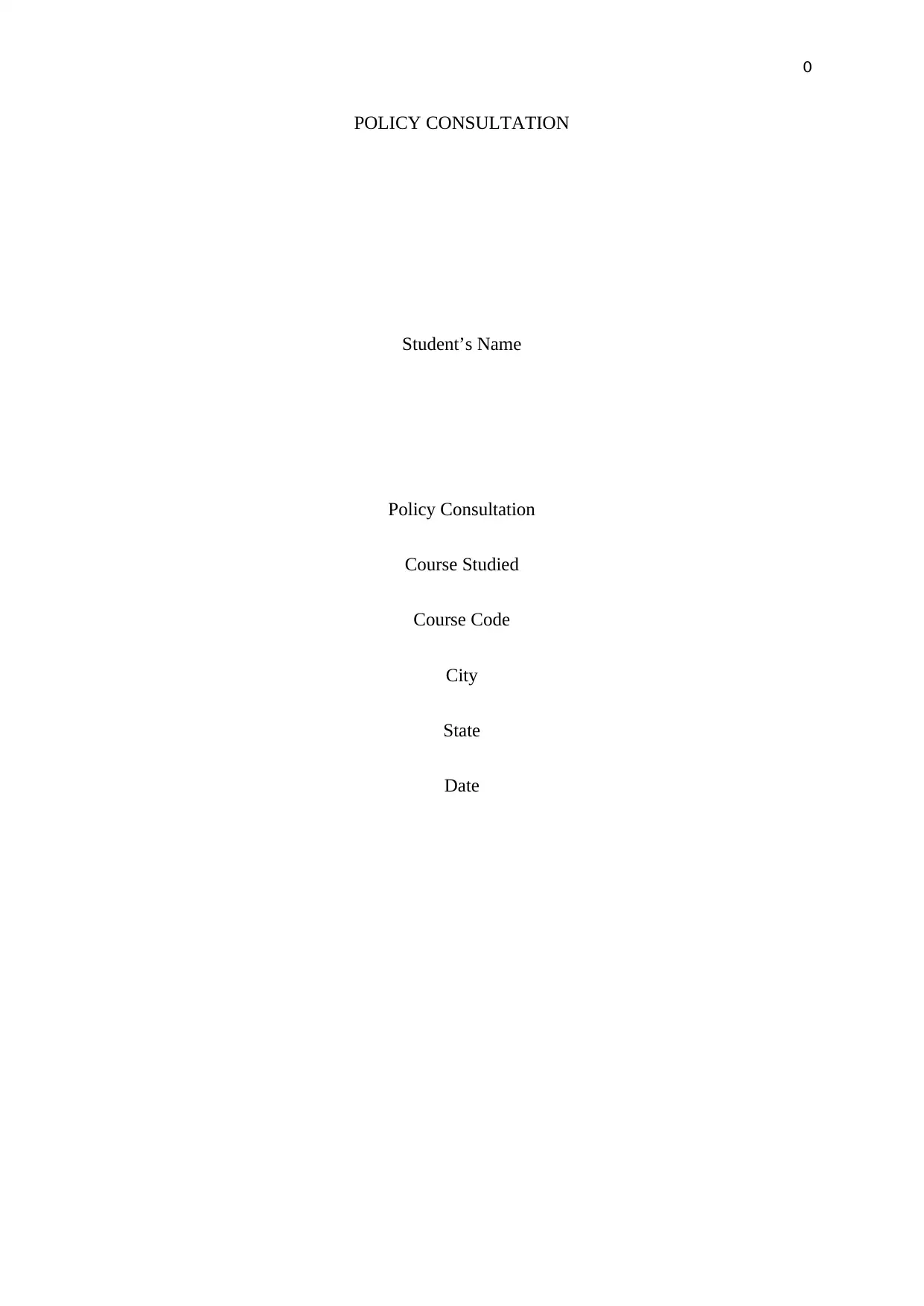
0
POLICY CONSULTATION
Student’s Name
Policy Consultation
Course Studied
Course Code
City
State
Date
POLICY CONSULTATION
Student’s Name
Policy Consultation
Course Studied
Course Code
City
State
Date
Paraphrase This Document
Need a fresh take? Get an instant paraphrase of this document with our AI Paraphraser
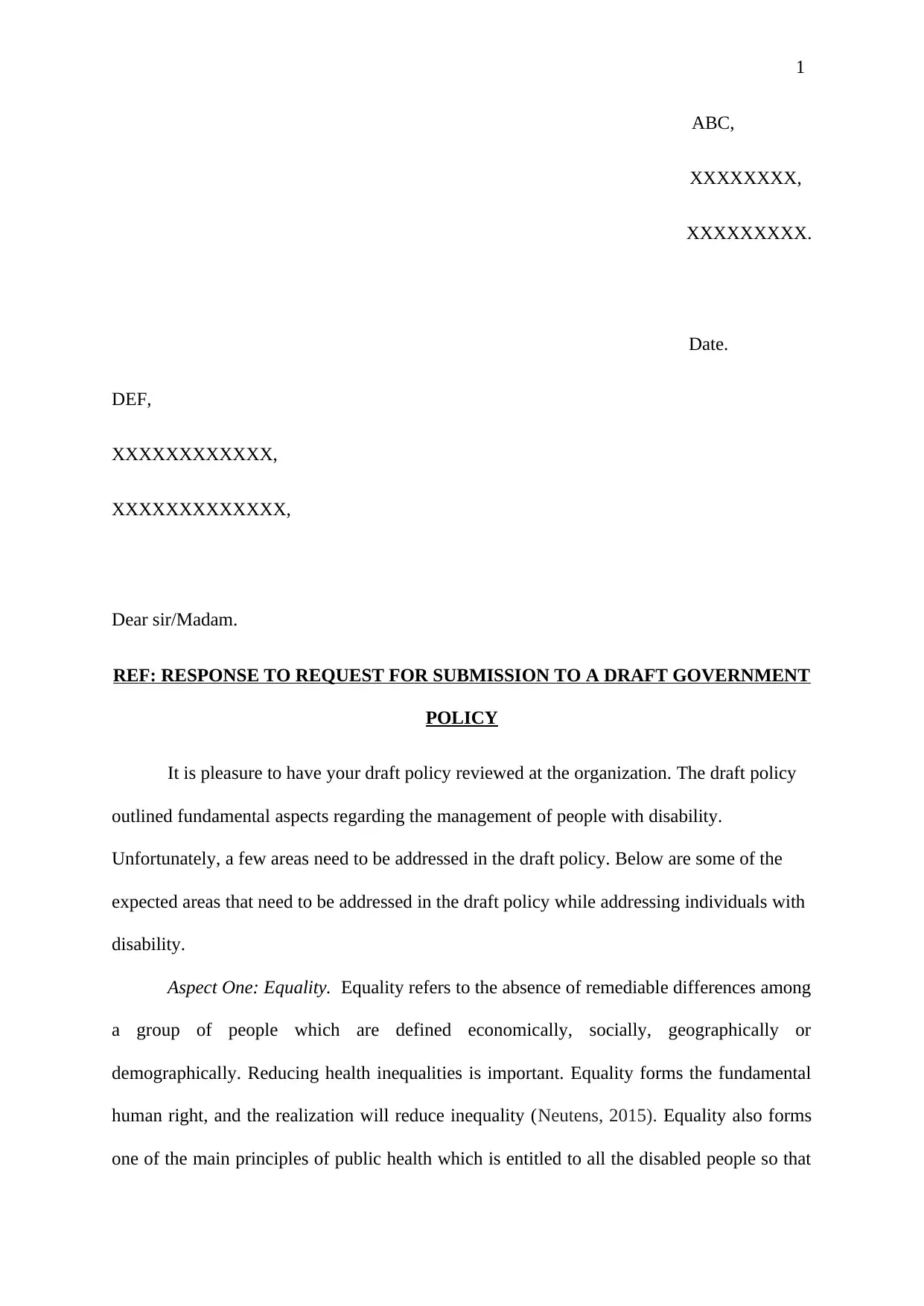
1
ABC,
XXXXXXXX,
XXXXXXXXX.
Date.
DEF,
XXXXXXXXXXXX,
XXXXXXXXXXXXX,
Dear sir/Madam.
REF: RESPONSE TO REQUEST FOR SUBMISSION TO A DRAFT GOVERNMENT
POLICY
It is pleasure to have your draft policy reviewed at the organization. The draft policy
outlined fundamental aspects regarding the management of people with disability.
Unfortunately, a few areas need to be addressed in the draft policy. Below are some of the
expected areas that need to be addressed in the draft policy while addressing individuals with
disability.
Aspect One: Equality. Equality refers to the absence of remediable differences among
a group of people which are defined economically, socially, geographically or
demographically. Reducing health inequalities is important. Equality forms the fundamental
human right, and the realization will reduce inequality (Neutens, 2015). Equality also forms
one of the main principles of public health which is entitled to all the disabled people so that
ABC,
XXXXXXXX,
XXXXXXXXX.
Date.
DEF,
XXXXXXXXXXXX,
XXXXXXXXXXXXX,
Dear sir/Madam.
REF: RESPONSE TO REQUEST FOR SUBMISSION TO A DRAFT GOVERNMENT
POLICY
It is pleasure to have your draft policy reviewed at the organization. The draft policy
outlined fundamental aspects regarding the management of people with disability.
Unfortunately, a few areas need to be addressed in the draft policy. Below are some of the
expected areas that need to be addressed in the draft policy while addressing individuals with
disability.
Aspect One: Equality. Equality refers to the absence of remediable differences among
a group of people which are defined economically, socially, geographically or
demographically. Reducing health inequalities is important. Equality forms the fundamental
human right, and the realization will reduce inequality (Neutens, 2015). Equality also forms
one of the main principles of public health which is entitled to all the disabled people so that
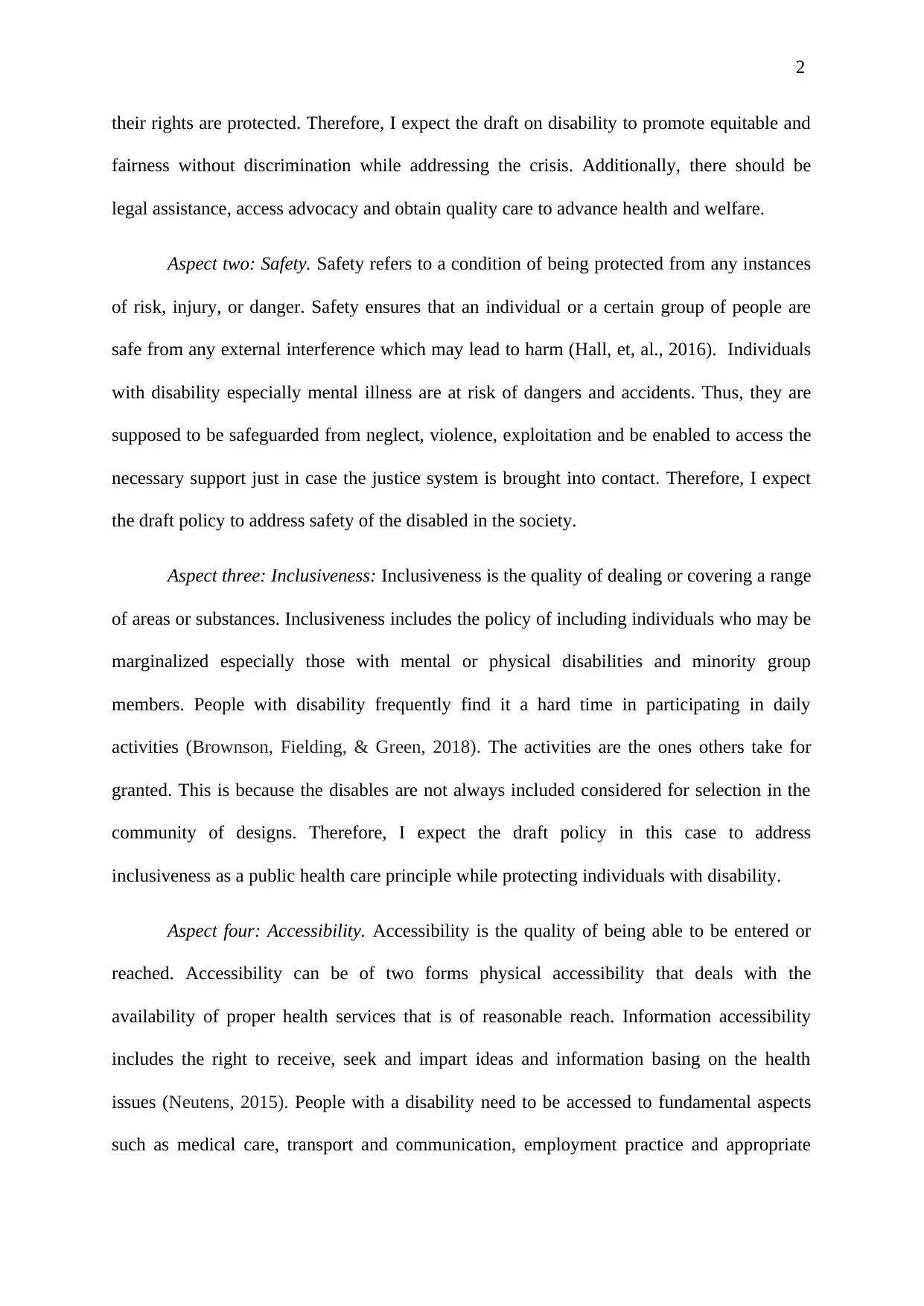
2
their rights are protected. Therefore, I expect the draft on disability to promote equitable and
fairness without discrimination while addressing the crisis. Additionally, there should be
legal assistance, access advocacy and obtain quality care to advance health and welfare.
Aspect two: Safety. Safety refers to a condition of being protected from any instances
of risk, injury, or danger. Safety ensures that an individual or a certain group of people are
safe from any external interference which may lead to harm (Hall, et, al., 2016). Individuals
with disability especially mental illness are at risk of dangers and accidents. Thus, they are
supposed to be safeguarded from neglect, violence, exploitation and be enabled to access the
necessary support just in case the justice system is brought into contact. Therefore, I expect
the draft policy to address safety of the disabled in the society.
Aspect three: Inclusiveness: Inclusiveness is the quality of dealing or covering a range
of areas or substances. Inclusiveness includes the policy of including individuals who may be
marginalized especially those with mental or physical disabilities and minority group
members. People with disability frequently find it a hard time in participating in daily
activities (Brownson, Fielding, & Green, 2018). The activities are the ones others take for
granted. This is because the disables are not always included considered for selection in the
community of designs. Therefore, I expect the draft policy in this case to address
inclusiveness as a public health care principle while protecting individuals with disability.
Aspect four: Accessibility. Accessibility is the quality of being able to be entered or
reached. Accessibility can be of two forms physical accessibility that deals with the
availability of proper health services that is of reasonable reach. Information accessibility
includes the right to receive, seek and impart ideas and information basing on the health
issues (Neutens, 2015). People with a disability need to be accessed to fundamental aspects
such as medical care, transport and communication, employment practice and appropriate
their rights are protected. Therefore, I expect the draft on disability to promote equitable and
fairness without discrimination while addressing the crisis. Additionally, there should be
legal assistance, access advocacy and obtain quality care to advance health and welfare.
Aspect two: Safety. Safety refers to a condition of being protected from any instances
of risk, injury, or danger. Safety ensures that an individual or a certain group of people are
safe from any external interference which may lead to harm (Hall, et, al., 2016). Individuals
with disability especially mental illness are at risk of dangers and accidents. Thus, they are
supposed to be safeguarded from neglect, violence, exploitation and be enabled to access the
necessary support just in case the justice system is brought into contact. Therefore, I expect
the draft policy to address safety of the disabled in the society.
Aspect three: Inclusiveness: Inclusiveness is the quality of dealing or covering a range
of areas or substances. Inclusiveness includes the policy of including individuals who may be
marginalized especially those with mental or physical disabilities and minority group
members. People with disability frequently find it a hard time in participating in daily
activities (Brownson, Fielding, & Green, 2018). The activities are the ones others take for
granted. This is because the disables are not always included considered for selection in the
community of designs. Therefore, I expect the draft policy in this case to address
inclusiveness as a public health care principle while protecting individuals with disability.
Aspect four: Accessibility. Accessibility is the quality of being able to be entered or
reached. Accessibility can be of two forms physical accessibility that deals with the
availability of proper health services that is of reasonable reach. Information accessibility
includes the right to receive, seek and impart ideas and information basing on the health
issues (Neutens, 2015). People with a disability need to be accessed to fundamental aspects
such as medical care, transport and communication, employment practice and appropriate
⊘ This is a preview!⊘
Do you want full access?
Subscribe today to unlock all pages.

Trusted by 1+ million students worldwide
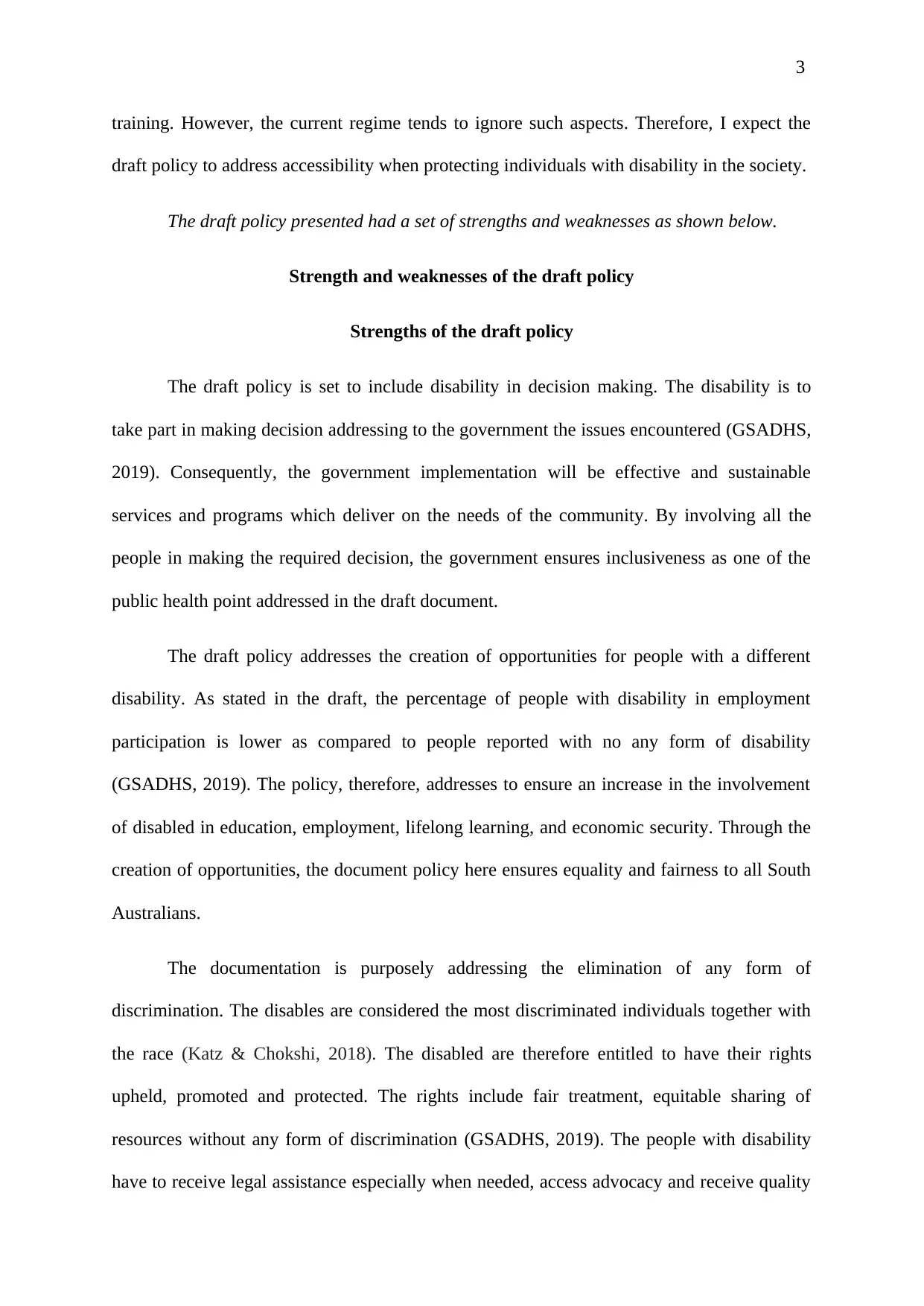
3
training. However, the current regime tends to ignore such aspects. Therefore, I expect the
draft policy to address accessibility when protecting individuals with disability in the society.
The draft policy presented had a set of strengths and weaknesses as shown below.
Strength and weaknesses of the draft policy
Strengths of the draft policy
The draft policy is set to include disability in decision making. The disability is to
take part in making decision addressing to the government the issues encountered (GSADHS,
2019). Consequently, the government implementation will be effective and sustainable
services and programs which deliver on the needs of the community. By involving all the
people in making the required decision, the government ensures inclusiveness as one of the
public health point addressed in the draft document.
The draft policy addresses the creation of opportunities for people with a different
disability. As stated in the draft, the percentage of people with disability in employment
participation is lower as compared to people reported with no any form of disability
(GSADHS, 2019). The policy, therefore, addresses to ensure an increase in the involvement
of disabled in education, employment, lifelong learning, and economic security. Through the
creation of opportunities, the document policy here ensures equality and fairness to all South
Australians.
The documentation is purposely addressing the elimination of any form of
discrimination. The disables are considered the most discriminated individuals together with
the race (Katz & Chokshi, 2018). The disabled are therefore entitled to have their rights
upheld, promoted and protected. The rights include fair treatment, equitable sharing of
resources without any form of discrimination (GSADHS, 2019). The people with disability
have to receive legal assistance especially when needed, access advocacy and receive quality
training. However, the current regime tends to ignore such aspects. Therefore, I expect the
draft policy to address accessibility when protecting individuals with disability in the society.
The draft policy presented had a set of strengths and weaknesses as shown below.
Strength and weaknesses of the draft policy
Strengths of the draft policy
The draft policy is set to include disability in decision making. The disability is to
take part in making decision addressing to the government the issues encountered (GSADHS,
2019). Consequently, the government implementation will be effective and sustainable
services and programs which deliver on the needs of the community. By involving all the
people in making the required decision, the government ensures inclusiveness as one of the
public health point addressed in the draft document.
The draft policy addresses the creation of opportunities for people with a different
disability. As stated in the draft, the percentage of people with disability in employment
participation is lower as compared to people reported with no any form of disability
(GSADHS, 2019). The policy, therefore, addresses to ensure an increase in the involvement
of disabled in education, employment, lifelong learning, and economic security. Through the
creation of opportunities, the document policy here ensures equality and fairness to all South
Australians.
The documentation is purposely addressing the elimination of any form of
discrimination. The disables are considered the most discriminated individuals together with
the race (Katz & Chokshi, 2018). The disabled are therefore entitled to have their rights
upheld, promoted and protected. The rights include fair treatment, equitable sharing of
resources without any form of discrimination (GSADHS, 2019). The people with disability
have to receive legal assistance especially when needed, access advocacy and receive quality
Paraphrase This Document
Need a fresh take? Get an instant paraphrase of this document with our AI Paraphraser
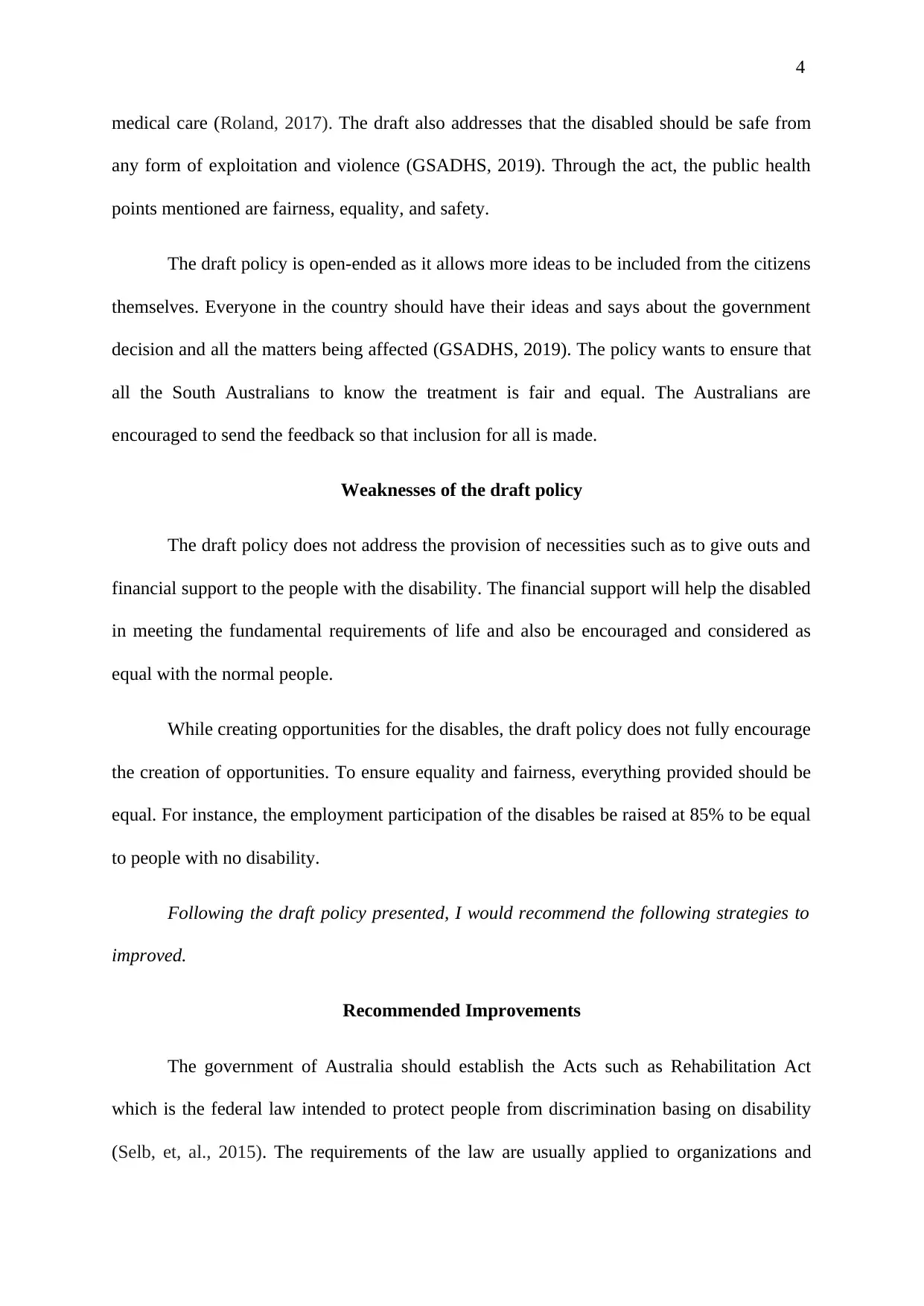
4
medical care (Roland, 2017). The draft also addresses that the disabled should be safe from
any form of exploitation and violence (GSADHS, 2019). Through the act, the public health
points mentioned are fairness, equality, and safety.
The draft policy is open-ended as it allows more ideas to be included from the citizens
themselves. Everyone in the country should have their ideas and says about the government
decision and all the matters being affected (GSADHS, 2019). The policy wants to ensure that
all the South Australians to know the treatment is fair and equal. The Australians are
encouraged to send the feedback so that inclusion for all is made.
Weaknesses of the draft policy
The draft policy does not address the provision of necessities such as to give outs and
financial support to the people with the disability. The financial support will help the disabled
in meeting the fundamental requirements of life and also be encouraged and considered as
equal with the normal people.
While creating opportunities for the disables, the draft policy does not fully encourage
the creation of opportunities. To ensure equality and fairness, everything provided should be
equal. For instance, the employment participation of the disables be raised at 85% to be equal
to people with no disability.
Following the draft policy presented, I would recommend the following strategies to
improved.
Recommended Improvements
The government of Australia should establish the Acts such as Rehabilitation Act
which is the federal law intended to protect people from discrimination basing on disability
(Selb, et, al., 2015). The requirements of the law are usually applied to organizations and
medical care (Roland, 2017). The draft also addresses that the disabled should be safe from
any form of exploitation and violence (GSADHS, 2019). Through the act, the public health
points mentioned are fairness, equality, and safety.
The draft policy is open-ended as it allows more ideas to be included from the citizens
themselves. Everyone in the country should have their ideas and says about the government
decision and all the matters being affected (GSADHS, 2019). The policy wants to ensure that
all the South Australians to know the treatment is fair and equal. The Australians are
encouraged to send the feedback so that inclusion for all is made.
Weaknesses of the draft policy
The draft policy does not address the provision of necessities such as to give outs and
financial support to the people with the disability. The financial support will help the disabled
in meeting the fundamental requirements of life and also be encouraged and considered as
equal with the normal people.
While creating opportunities for the disables, the draft policy does not fully encourage
the creation of opportunities. To ensure equality and fairness, everything provided should be
equal. For instance, the employment participation of the disables be raised at 85% to be equal
to people with no disability.
Following the draft policy presented, I would recommend the following strategies to
improved.
Recommended Improvements
The government of Australia should establish the Acts such as Rehabilitation Act
which is the federal law intended to protect people from discrimination basing on disability
(Selb, et, al., 2015). The requirements of the law are usually applied to organizations and
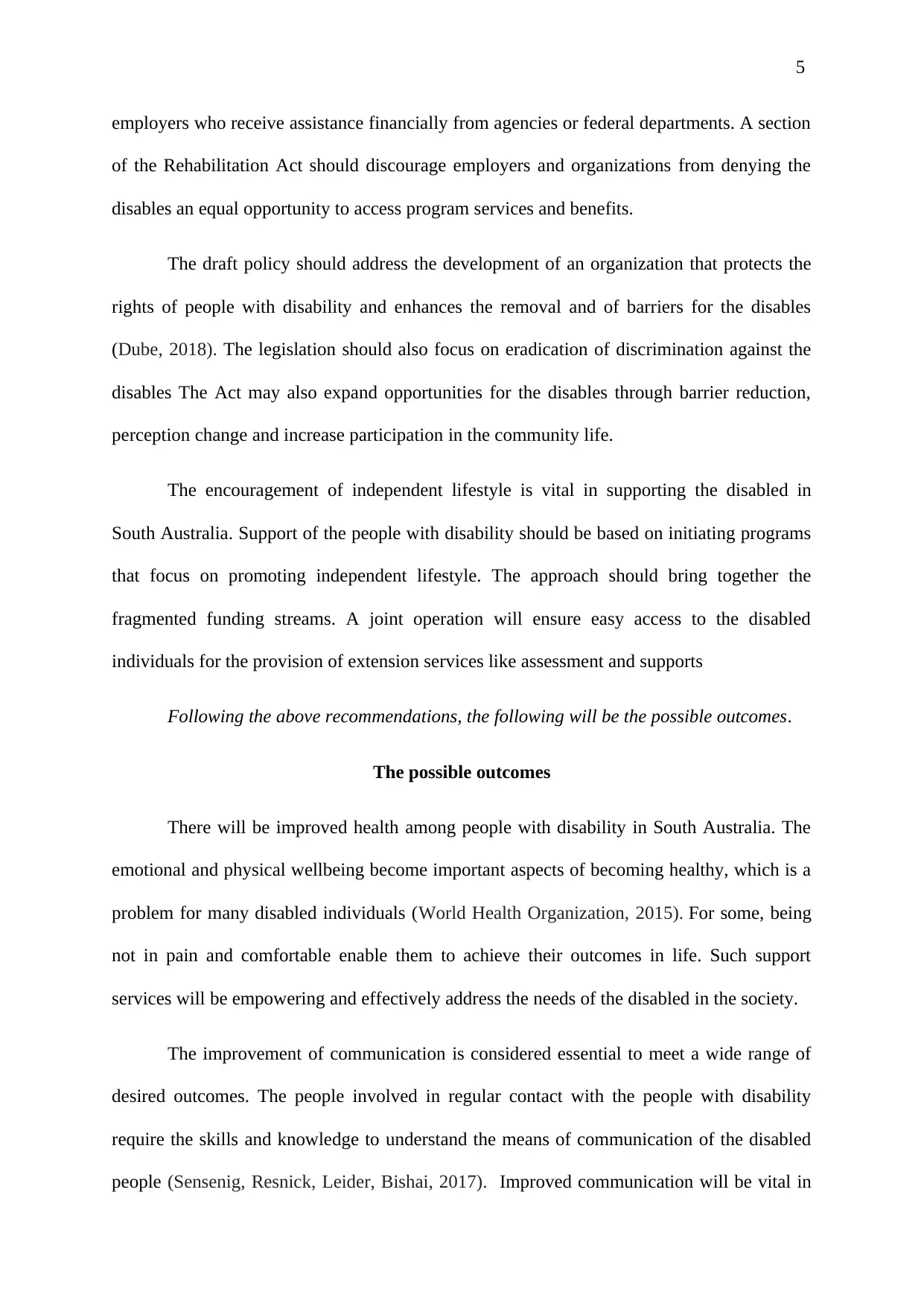
5
employers who receive assistance financially from agencies or federal departments. A section
of the Rehabilitation Act should discourage employers and organizations from denying the
disables an equal opportunity to access program services and benefits.
The draft policy should address the development of an organization that protects the
rights of people with disability and enhances the removal and of barriers for the disables
(Dube, 2018). The legislation should also focus on eradication of discrimination against the
disables The Act may also expand opportunities for the disables through barrier reduction,
perception change and increase participation in the community life.
The encouragement of independent lifestyle is vital in supporting the disabled in
South Australia. Support of the people with disability should be based on initiating programs
that focus on promoting independent lifestyle. The approach should bring together the
fragmented funding streams. A joint operation will ensure easy access to the disabled
individuals for the provision of extension services like assessment and supports
Following the above recommendations, the following will be the possible outcomes.
The possible outcomes
There will be improved health among people with disability in South Australia. The
emotional and physical wellbeing become important aspects of becoming healthy, which is a
problem for many disabled individuals (World Health Organization, 2015). For some, being
not in pain and comfortable enable them to achieve their outcomes in life. Such support
services will be empowering and effectively address the needs of the disabled in the society.
The improvement of communication is considered essential to meet a wide range of
desired outcomes. The people involved in regular contact with the people with disability
require the skills and knowledge to understand the means of communication of the disabled
people (Sensenig, Resnick, Leider, Bishai, 2017). Improved communication will be vital in
employers who receive assistance financially from agencies or federal departments. A section
of the Rehabilitation Act should discourage employers and organizations from denying the
disables an equal opportunity to access program services and benefits.
The draft policy should address the development of an organization that protects the
rights of people with disability and enhances the removal and of barriers for the disables
(Dube, 2018). The legislation should also focus on eradication of discrimination against the
disables The Act may also expand opportunities for the disables through barrier reduction,
perception change and increase participation in the community life.
The encouragement of independent lifestyle is vital in supporting the disabled in
South Australia. Support of the people with disability should be based on initiating programs
that focus on promoting independent lifestyle. The approach should bring together the
fragmented funding streams. A joint operation will ensure easy access to the disabled
individuals for the provision of extension services like assessment and supports
Following the above recommendations, the following will be the possible outcomes.
The possible outcomes
There will be improved health among people with disability in South Australia. The
emotional and physical wellbeing become important aspects of becoming healthy, which is a
problem for many disabled individuals (World Health Organization, 2015). For some, being
not in pain and comfortable enable them to achieve their outcomes in life. Such support
services will be empowering and effectively address the needs of the disabled in the society.
The improvement of communication is considered essential to meet a wide range of
desired outcomes. The people involved in regular contact with the people with disability
require the skills and knowledge to understand the means of communication of the disabled
people (Sensenig, Resnick, Leider, Bishai, 2017). Improved communication will be vital in
⊘ This is a preview!⊘
Do you want full access?
Subscribe today to unlock all pages.

Trusted by 1+ million students worldwide
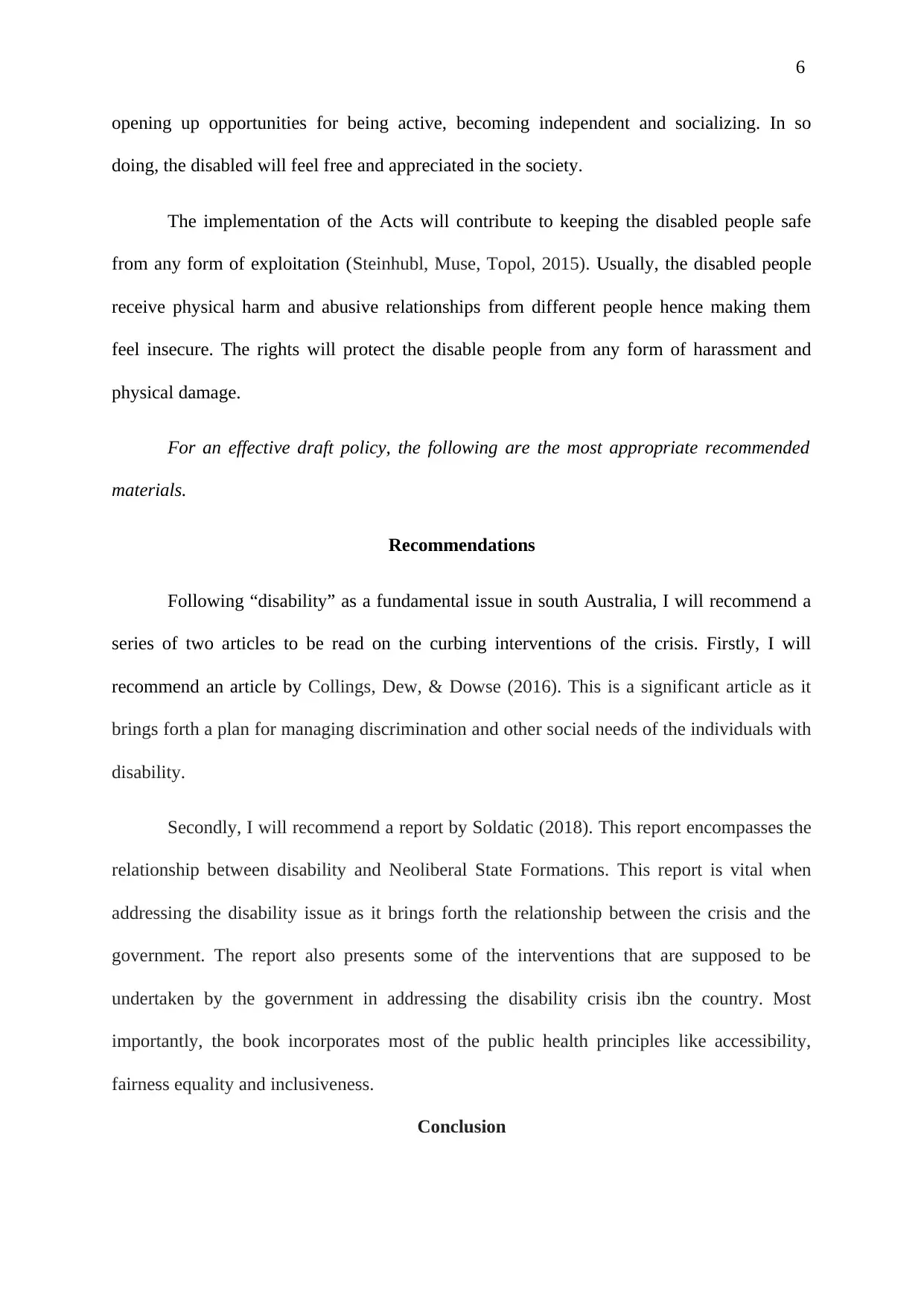
6
opening up opportunities for being active, becoming independent and socializing. In so
doing, the disabled will feel free and appreciated in the society.
The implementation of the Acts will contribute to keeping the disabled people safe
from any form of exploitation (Steinhubl, Muse, Topol, 2015). Usually, the disabled people
receive physical harm and abusive relationships from different people hence making them
feel insecure. The rights will protect the disable people from any form of harassment and
physical damage.
For an effective draft policy, the following are the most appropriate recommended
materials.
Recommendations
Following “disability” as a fundamental issue in south Australia, I will recommend a
series of two articles to be read on the curbing interventions of the crisis. Firstly, I will
recommend an article by Collings, Dew, & Dowse (2016). This is a significant article as it
brings forth a plan for managing discrimination and other social needs of the individuals with
disability.
Secondly, I will recommend a report by Soldatic (2018). This report encompasses the
relationship between disability and Neoliberal State Formations. This report is vital when
addressing the disability issue as it brings forth the relationship between the crisis and the
government. The report also presents some of the interventions that are supposed to be
undertaken by the government in addressing the disability crisis ibn the country. Most
importantly, the book incorporates most of the public health principles like accessibility,
fairness equality and inclusiveness.
Conclusion
opening up opportunities for being active, becoming independent and socializing. In so
doing, the disabled will feel free and appreciated in the society.
The implementation of the Acts will contribute to keeping the disabled people safe
from any form of exploitation (Steinhubl, Muse, Topol, 2015). Usually, the disabled people
receive physical harm and abusive relationships from different people hence making them
feel insecure. The rights will protect the disable people from any form of harassment and
physical damage.
For an effective draft policy, the following are the most appropriate recommended
materials.
Recommendations
Following “disability” as a fundamental issue in south Australia, I will recommend a
series of two articles to be read on the curbing interventions of the crisis. Firstly, I will
recommend an article by Collings, Dew, & Dowse (2016). This is a significant article as it
brings forth a plan for managing discrimination and other social needs of the individuals with
disability.
Secondly, I will recommend a report by Soldatic (2018). This report encompasses the
relationship between disability and Neoliberal State Formations. This report is vital when
addressing the disability issue as it brings forth the relationship between the crisis and the
government. The report also presents some of the interventions that are supposed to be
undertaken by the government in addressing the disability crisis ibn the country. Most
importantly, the book incorporates most of the public health principles like accessibility,
fairness equality and inclusiveness.
Conclusion
Paraphrase This Document
Need a fresh take? Get an instant paraphrase of this document with our AI Paraphraser
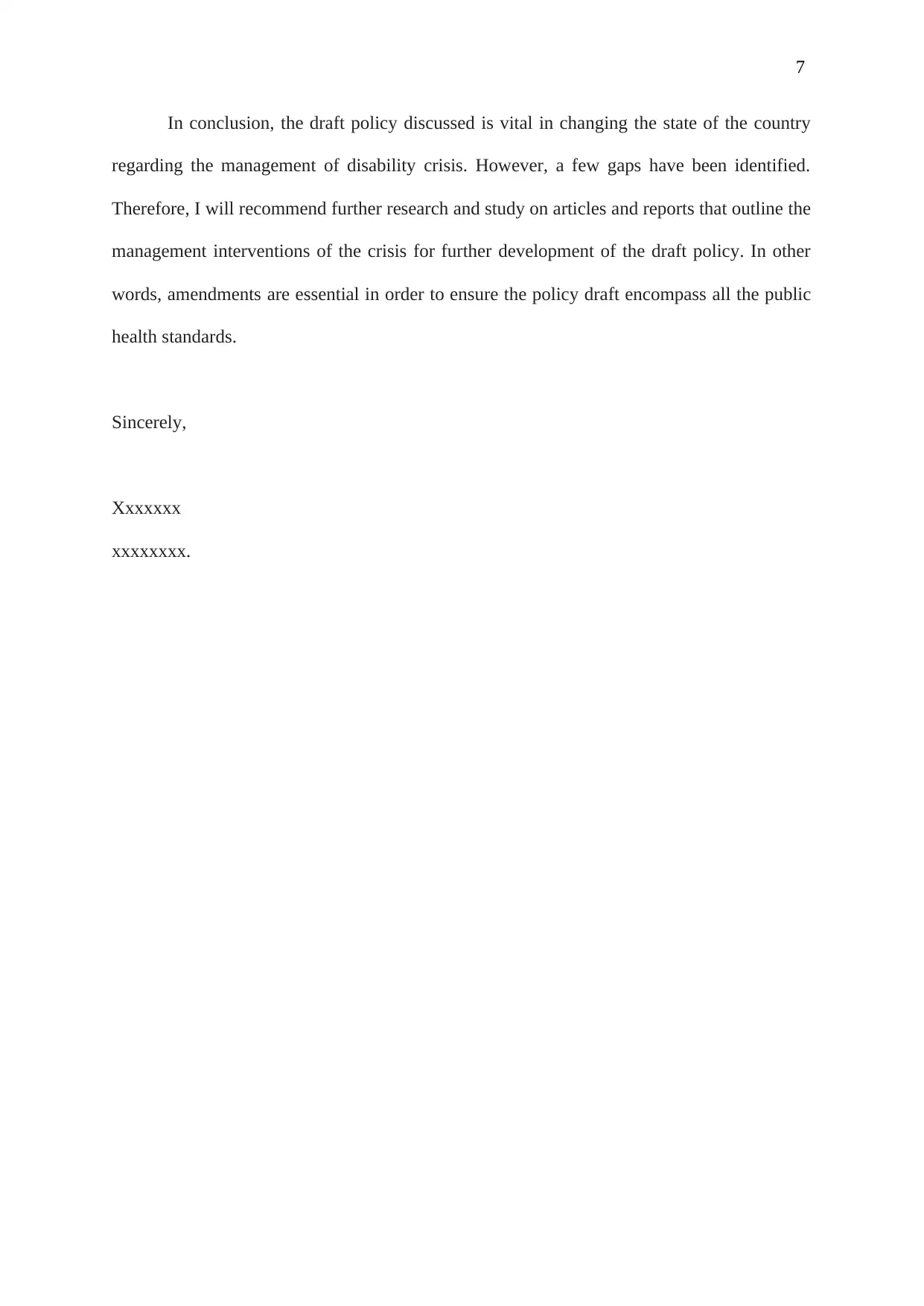
7
In conclusion, the draft policy discussed is vital in changing the state of the country
regarding the management of disability crisis. However, a few gaps have been identified.
Therefore, I will recommend further research and study on articles and reports that outline the
management interventions of the crisis for further development of the draft policy. In other
words, amendments are essential in order to ensure the policy draft encompass all the public
health standards.
Sincerely,
Xxxxxxx
xxxxxxxx.
In conclusion, the draft policy discussed is vital in changing the state of the country
regarding the management of disability crisis. However, a few gaps have been identified.
Therefore, I will recommend further research and study on articles and reports that outline the
management interventions of the crisis for further development of the draft policy. In other
words, amendments are essential in order to ensure the policy draft encompass all the public
health standards.
Sincerely,
Xxxxxxx
xxxxxxxx.
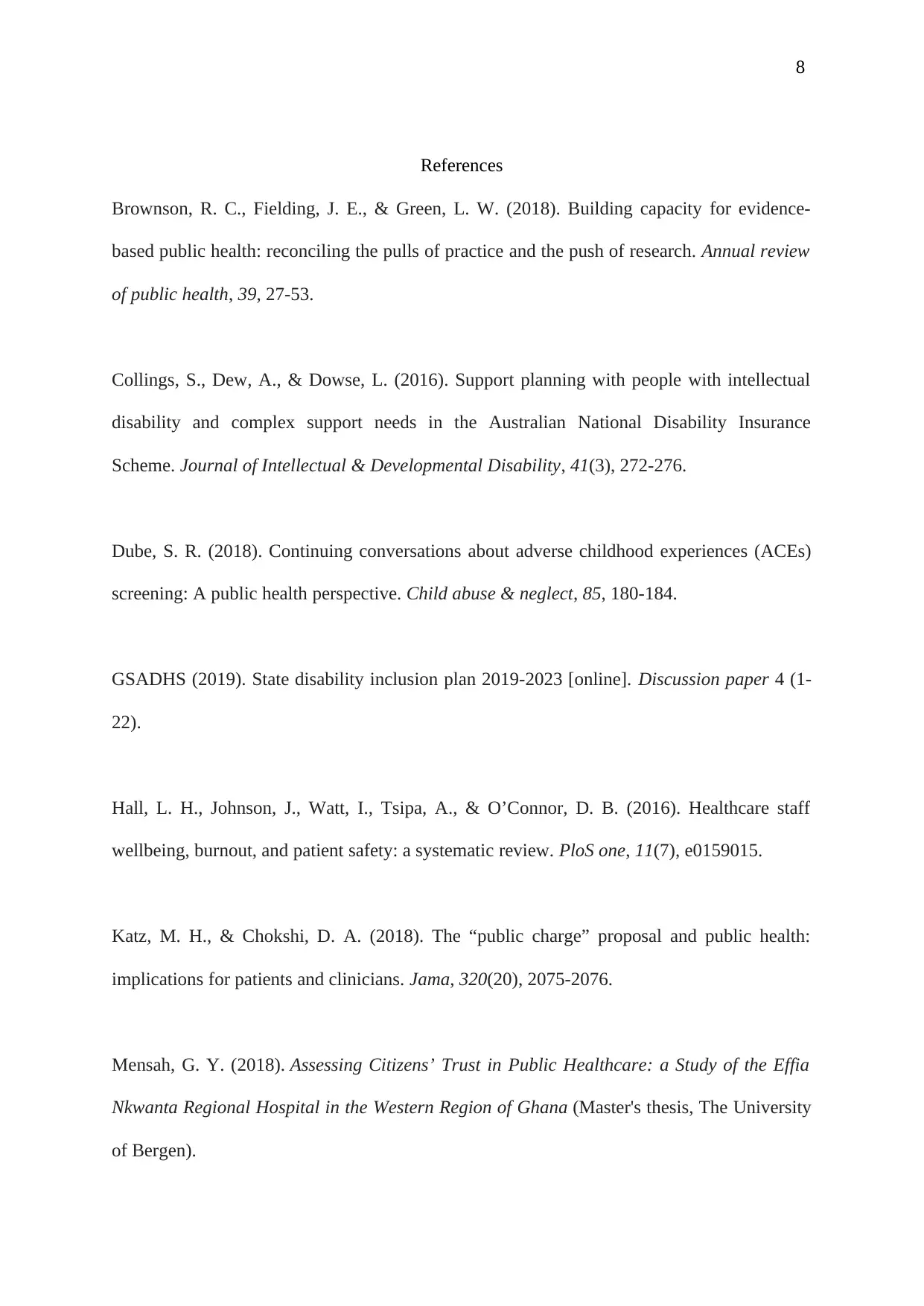
8
References
Brownson, R. C., Fielding, J. E., & Green, L. W. (2018). Building capacity for evidence-
based public health: reconciling the pulls of practice and the push of research. Annual review
of public health, 39, 27-53.
Collings, S., Dew, A., & Dowse, L. (2016). Support planning with people with intellectual
disability and complex support needs in the Australian National Disability Insurance
Scheme. Journal of Intellectual & Developmental Disability, 41(3), 272-276.
Dube, S. R. (2018). Continuing conversations about adverse childhood experiences (ACEs)
screening: A public health perspective. Child abuse & neglect, 85, 180-184.
GSADHS (2019). State disability inclusion plan 2019-2023 [online]. Discussion paper 4 (1-
22).
Hall, L. H., Johnson, J., Watt, I., Tsipa, A., & O’Connor, D. B. (2016). Healthcare staff
wellbeing, burnout, and patient safety: a systematic review. PloS one, 11(7), e0159015.
Katz, M. H., & Chokshi, D. A. (2018). The “public charge” proposal and public health:
implications for patients and clinicians. Jama, 320(20), 2075-2076.
Mensah, G. Y. (2018). Assessing Citizens’ Trust in Public Healthcare: a Study of the Effia
Nkwanta Regional Hospital in the Western Region of Ghana (Master's thesis, The University
of Bergen).
References
Brownson, R. C., Fielding, J. E., & Green, L. W. (2018). Building capacity for evidence-
based public health: reconciling the pulls of practice and the push of research. Annual review
of public health, 39, 27-53.
Collings, S., Dew, A., & Dowse, L. (2016). Support planning with people with intellectual
disability and complex support needs in the Australian National Disability Insurance
Scheme. Journal of Intellectual & Developmental Disability, 41(3), 272-276.
Dube, S. R. (2018). Continuing conversations about adverse childhood experiences (ACEs)
screening: A public health perspective. Child abuse & neglect, 85, 180-184.
GSADHS (2019). State disability inclusion plan 2019-2023 [online]. Discussion paper 4 (1-
22).
Hall, L. H., Johnson, J., Watt, I., Tsipa, A., & O’Connor, D. B. (2016). Healthcare staff
wellbeing, burnout, and patient safety: a systematic review. PloS one, 11(7), e0159015.
Katz, M. H., & Chokshi, D. A. (2018). The “public charge” proposal and public health:
implications for patients and clinicians. Jama, 320(20), 2075-2076.
Mensah, G. Y. (2018). Assessing Citizens’ Trust in Public Healthcare: a Study of the Effia
Nkwanta Regional Hospital in the Western Region of Ghana (Master's thesis, The University
of Bergen).
⊘ This is a preview!⊘
Do you want full access?
Subscribe today to unlock all pages.

Trusted by 1+ million students worldwide
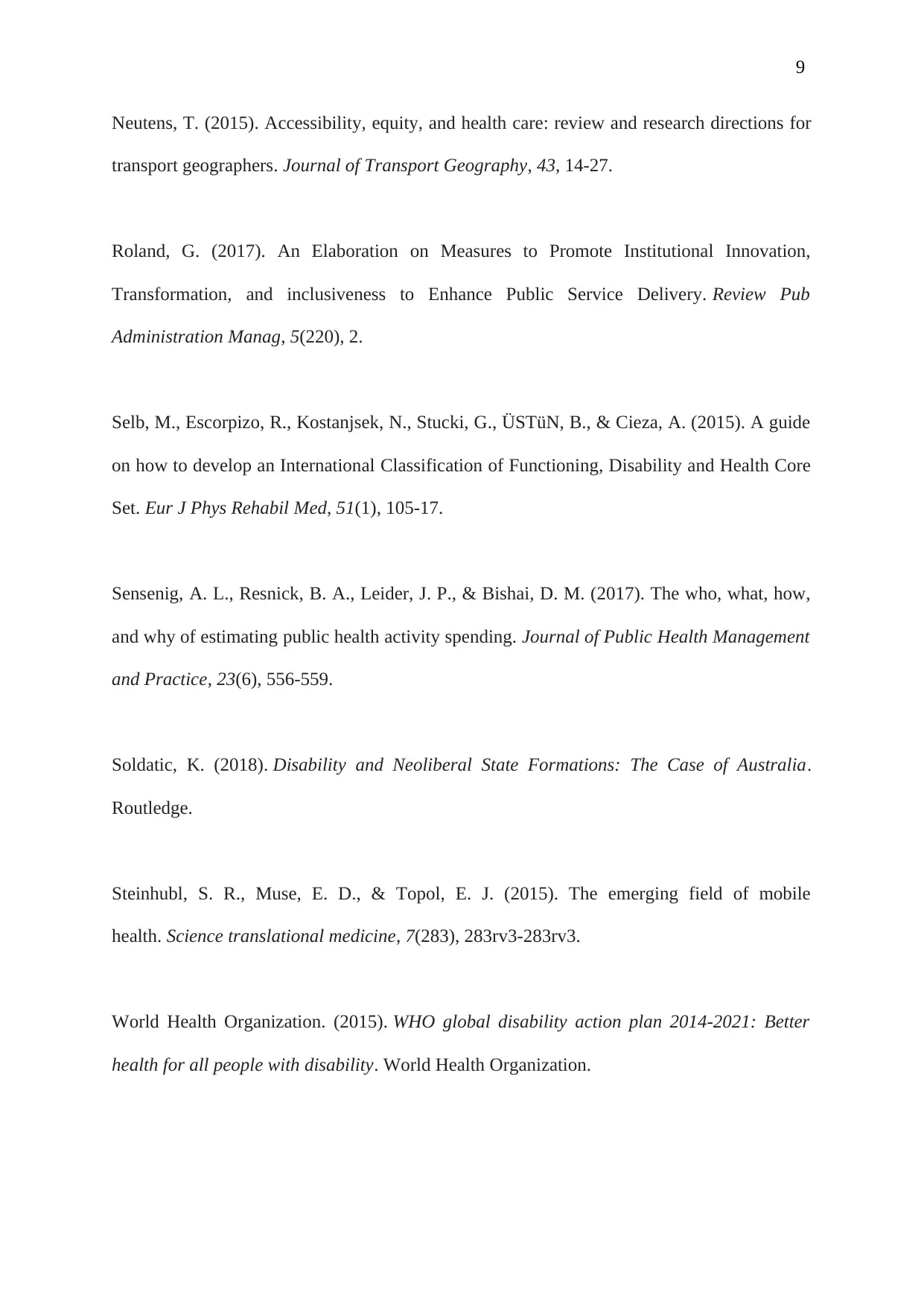
9
Neutens, T. (2015). Accessibility, equity, and health care: review and research directions for
transport geographers. Journal of Transport Geography, 43, 14-27.
Roland, G. (2017). An Elaboration on Measures to Promote Institutional Innovation,
Transformation, and inclusiveness to Enhance Public Service Delivery. Review Pub
Administration Manag, 5(220), 2.
Selb, M., Escorpizo, R., Kostanjsek, N., Stucki, G., ÜSTüN, B., & Cieza, A. (2015). A guide
on how to develop an International Classification of Functioning, Disability and Health Core
Set. Eur J Phys Rehabil Med, 51(1), 105-17.
Sensenig, A. L., Resnick, B. A., Leider, J. P., & Bishai, D. M. (2017). The who, what, how,
and why of estimating public health activity spending. Journal of Public Health Management
and Practice, 23(6), 556-559.
Soldatic, K. (2018). Disability and Neoliberal State Formations: The Case of Australia.
Routledge.
Steinhubl, S. R., Muse, E. D., & Topol, E. J. (2015). The emerging field of mobile
health. Science translational medicine, 7(283), 283rv3-283rv3.
World Health Organization. (2015). WHO global disability action plan 2014-2021: Better
health for all people with disability. World Health Organization.
Neutens, T. (2015). Accessibility, equity, and health care: review and research directions for
transport geographers. Journal of Transport Geography, 43, 14-27.
Roland, G. (2017). An Elaboration on Measures to Promote Institutional Innovation,
Transformation, and inclusiveness to Enhance Public Service Delivery. Review Pub
Administration Manag, 5(220), 2.
Selb, M., Escorpizo, R., Kostanjsek, N., Stucki, G., ÜSTüN, B., & Cieza, A. (2015). A guide
on how to develop an International Classification of Functioning, Disability and Health Core
Set. Eur J Phys Rehabil Med, 51(1), 105-17.
Sensenig, A. L., Resnick, B. A., Leider, J. P., & Bishai, D. M. (2017). The who, what, how,
and why of estimating public health activity spending. Journal of Public Health Management
and Practice, 23(6), 556-559.
Soldatic, K. (2018). Disability and Neoliberal State Formations: The Case of Australia.
Routledge.
Steinhubl, S. R., Muse, E. D., & Topol, E. J. (2015). The emerging field of mobile
health. Science translational medicine, 7(283), 283rv3-283rv3.
World Health Organization. (2015). WHO global disability action plan 2014-2021: Better
health for all people with disability. World Health Organization.
1 out of 10
Related Documents
Your All-in-One AI-Powered Toolkit for Academic Success.
+13062052269
info@desklib.com
Available 24*7 on WhatsApp / Email
![[object Object]](/_next/static/media/star-bottom.7253800d.svg)
Unlock your academic potential
Copyright © 2020–2026 A2Z Services. All Rights Reserved. Developed and managed by ZUCOL.




